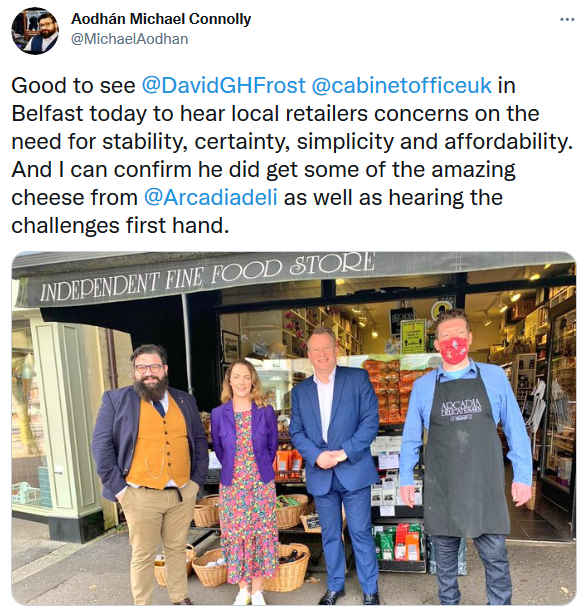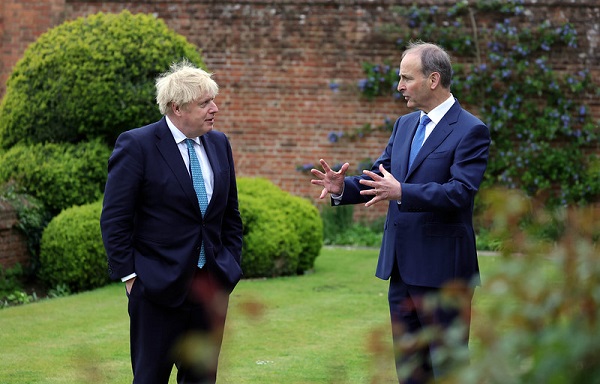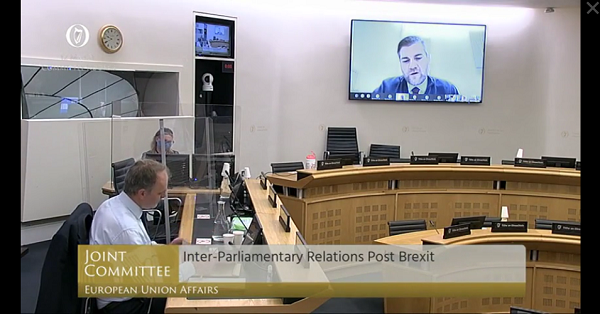Brexit Brief Newsletter
17 May 2021

Welcome to the 17 May 2021 newsletter
Last week Lord Frost visited Northern Ireland to engage with stakeholders on the Protocol on Ireland/Northern Ireland. Details of the UK’s roadmap on implementing the Protocol have been seen by media. Concerns have been raised over the Protocol’s impact on supply of medicines to NI. The Committee for the Executive Office has been engaging with the Oireachtas on EU matters.
Engagement on the Protocol
Without any fanfare, Lord Frost and Brandon Lewis were in Northern Ireland for a two-day visit last week. The Minister of State responsible for Brexit and Secretary of State for Northern Ireland met with businesses and community representatives “to listen to their experiences and to reaffirm the Government’s commitment to address issues with the Northern Ireland Protocol”. Frost spoke to businesses from the aerospace, manufacturing, food and drink, retail, and life sciences sectors. The UK politicians also visited Larne Port and met staff from Border Force, the Department for Agriculture, Environment and Rural Affairs and the European Commission.
In a statement, Frost and Lewis outlined the concerns they had heard “about the level and complexity of paperwork required even on goods remaining in Northern Ireland, notably in the agrifood sector; about disruption to supply chains from Great Britain and consequent diversion of trade; and about the risks associated with the expiry of the grace periods and the introduction of further processes as a result.”
Frost said that, “It’s clear from my visit that the Protocol is presenting significant challenges for many in Northern Ireland. Businesses have gone to extraordinary efforts to make the current requirements work, but it is hard to see that the way the Protocol is currently operating can be sustainable for long… I hope they [the EU] will take a common sense, risk-based approach that enables us to agree a pragmatic way forward that substantially eases the burdens on Northern Ireland.”

Lord Frost visits a NI business. Source: Aodhán Connolly on Twitter
Writing in the Mail on Sunday, Lord Frost said that the new EU-UK relationship “won't be right until we have dealt with the problems arising from the Northern Ireland Protocol.” He writes that “fundamental aims behind this new Protocol are worthy ones” but he argues that “If the Protocol operates so as to damage the political, social, or economic fabric of life in Northern Ireland, then that situation cannot be sustained for long. We are responsible for protecting the peace and prosperity of everyone in Northern Ireland and we will continue to consider all our options for doing so.” He calls on the EU to “stop point-scoring and work with us”.
Frost will appear before the House of Lords European Affairs Committee tomorrow at 4pm.
Roadmap
At the end of March, the UK delivered a ‘roadmap’ to the EU on the implementation of the Protocol. The BBC has seen the roadmap which states that “The UK will roll out official certification in four phases”. Phase 1 would begin in October for fresh meat products; Phase 2 would cover dairy products, plants, and wine; Phases 3 and 4 would cover fruit and vegetable marketing standards, and pet food and organic products.
The UK’s document also covers issues such as medicines, VAT, and pet travel which have been causing concern in recent months. There are reports that Lord Frost has set July as his deadline for deciding whether the Protocol can work in the long term.
The BBC states that “some parts of the roadmap are vague”, noting that there are no target dates for the construction of permanent border control posts at NI ports. In other areas, there are more specific commitments: the UK says it will issue guidance by the end of this month on GB-NI business to consumer parcel deliveries.
Legal action
The EU had initiated legal action against the UK after it unilaterally extended grace periods for the Protocol. On Friday, the EU confirmed it has received the UK’s response. A spokesperson said “The Commission will now assess the contents of the letter before deciding on next steps.”
PM-Taoiseach meeting
The Taoiseach Micheál Martin and Prime Minister Boris Johnson met at Chequers on Friday afternoon. According to a UK Government statement the leaders “agreed on the importance of working together to uphold the Belfast/Good Friday Agreement and to maintain smooth trade between Great Britain, Northern Ireland and the Republic of Ireland.” Media reports that David Frost was also in attendance at the meeting, so we can presume that EU matters were high on the agenda. Martin said he believed the EU wished to be constructive in negotiations on the Protocol.
Today RTÉ reports that the Irish Government is “concerned at the increasingly hostile tone of the UK Government” in relation to the Protocol. There is concern in Dublin that the UK Government is pushing for a “complete rewriting” of the Protocol, which goes much further than flexibilities.

Taoiseach Micheál Martin meeting with Boris Johnson at Chequers. Source: Number 10/UK Prime Minister
NI Assembly Committee engages with Oireachtas
The Committee for the Executive Office met with the Oireachtas Committee on European Union Affairs on Wednesday 12 May. Colin McGrath(SDLP), Martina Anderson(Sinn Féin) and Emma Sheerin(Sinn Féin) attended the meeting from the NI Assembly Committee.
Neale Richmond TD said that there is scope for the relationship between the Committees to be formalised. The Oireachtas Committee stated plans to hold quarterly meetings with the Executive Office Committee. Chair of Executive Office Committee Colin McGrath said it was important that “in the absence of something more formal between the EU and the North, that we maximise the opportunities to come together to have voices heard,” noting the work of the British-Irish Parliamentary Assembly.
Regarding the Protocol, Richmond said that Irish politicians “have a very specific role within the European Union to be the voice for common sense and flexibility on the ground with regard to ports of entry into Northern Ireland.” Martina Anderson argued that “We in the North, as EU rights holders and citizens, therefore have a right to participate in the Union”. She said that, “We are in a unique situation because we are half in the EU and half out of it.” Dara Calleary TD suggested that the NI Assembly Committee invite Maroš Šefčovič to address them: “It would provide a direct forum for presenting the views of the committee and MLAs about Northern Ireland in future,” he said.
Ruairí Ó Murchú TD pointed out that “This is a terribly agreeable committee.” Emma Sheerin said it was “regrettable” that there was no unionist representation at the meeting: “A person who is not at the table cannot have his or her say and that is unfortunate.”

Chair of the Executive Office Committee Colin McGrath engaging with Oireachtas members | Source: OIreachtas
Chair of the Oireachtas Committee Joe McHugh TD asked how much Brexit consumed political discourse in Northern Ireland, and whether it takes precedence over other important issues. McGrath said that “I find it hugely frustrating that there are nearly 200 parliamentary questions tabled to the Executive Office which have not been answered. We know there is a requirement for them to be signed off by both parties but issues such as Brexit cause problems that mean the normal day-to-day operation of democracy does not take place. Some fundamental issues are not being dealt with.” He said that “much of that[work] is frustrated because of the perspectives on Brexit preventing the daily work from taking place.”
Later on Wednesday, the Committee for the Executive Office was briefed by the EU Affairs Manager. Doug Beattie (UUP) said he “didn’t shy away” from engagement with the Irish Senead but asked about meeting with the Northern Ireland Affairs Committee in Westminster. He said it would have been great if Lord Frost had engaged with the Committee while he was in Belfast. Chair Colin McGrath said if they are going to ask Šefčovič to the Committee, they could also ask Lord Frost to attend.
Medicines regulation and the Protocol
On Friday, the Newsletter reported that a new cancer treatment has been approved for patients in Great Britain but not for Northern Ireland “because of the Irish Sea border”. A spokesperson for the European Commission responded to the article on Twitter, saying it “is entirely incorrect”, arguing the Protocol, and the “tailor-made solutions” of December last year, ensure the continued availability of medicines in NI. The spokesperson cited derogations in EU law for NI, for example for market authorisation requirements.
Responding to the concerns about medicines supplies, UUP Health spokesperson Alan Chambers said “The Department of Health under the leadership of Robin Swann is working to find solutions and ensure that speculation does not become a reality.”
Today a Private Members’ Motion on ‘Unfettered Access to Medicines and Medical Devices’ will be debated at the Assembly; this is scheduled for 1.30pm. On Tuesday, Minister for Health Robin Swann will be taking questions in the Assembly and we can expect this matter to be raised. Proceedings can be viewed at niassembly.tv
Simon Coveney on the ‘State of the Union’
Irish Minister of Foreign Affairs Simon Coveney addressed the Institute of International and European Affairs(IIEA) on Thursday. He said the new EU-UK relationship is very different, “a reality we must accept and we must adapt to”. He pointed to challenges facing Ireland’s fisheries, hauliers, importers and exporters who “find themselves at the sharp end of Brexit”. He said the allocation of 21% of the EU’s Brexit Adjustment Reserve was “another clear expression of EU solidarity with those most acutely affected by Brexit”.
He said while the Protocol has experienced significant challenges, it “remains the vital framework”. He said they continue to engage with those in NI who have “very real concerns about the implementation of the Protocol”, which the EU is “acutely conscious of”. He called for partnership rather than unilateralism in the period ahead. He noted genuine concerns on the Protocol’s impact and implementation in NI which should be listened to. Coveney believes the EU-UK relationship is better now than it was a few weeks ago and said “we will do as much as we can to try and advocate for pragmatism and change” but this has to be within the confines of the Protocol: “The truth is there isn’t any alternative there to the Protocol that doesn’t involve more difficult decisions.”
Other news
- On Friday, the hearing began of a legal challenge to the Protocol on Ireland/Northern Ireland brought by unionist political leaders including DUP leader Arlene Foster, UUP leader Steve Aiken and TUV leader Jim Allister. They argue that the Protocol is unlawful as it breaches the Act of Union and the Good Friday/Belfast Agreement.
- A paper from the Centre for Cross Border Studies considers to what extent mechanisms in the Protocol are open to engagement by civic society. The paper states that in the short space of time following the implementation of the Protocol, “it has become increasingly apparent that the UK Government and European Commission must seek a wider process of engagement with civil society that goes beyond the business community.” The paper argues that looking for solutions without representation from civic society risks arriving at solutions “that may remedy disruption to business but can simultaneously create problems in terms of social cohesion.”
- The Centre for Cross Border Studies has also published a paper on the future for Agri-food in Northern Ireland and on the island of Ireland. The paper states that “Farming and agri-food production are at the heart of communities across Northern Ireland for whom the risk of declining farm incomes has been increased by Brexit due to the loss of EU CAP direct payment supports, which previously comprised up to 90% of individual farm incomes. And there is no certainty the UK will maintain this level of support… So a joined up North/South approach to the future of agri-food on the island would be a positive and significant contribution to continuing that vital work.”
- The Irish Central Border Area Network (ICBAN), a cross-border group of local authorities for the Central Border Region, along with a team from Queen’s University Belfast, are researching the impact of Brexit for people in this region. They invite people living in the central border area to complete their survey. Read their previous research on “The Border into Brexit”.
- The results have been published of a survey by the Independent Monitoring Authority on the experiences of EU citizens living in the UK. The survey finds that 30% of respondents are not confident their citizens’ rights will be upheld by public bodies, and 1 in 10 are considering leaving the UK after the 30 June (the date of the closure of the EU Settlement Scheme).
- A survey by Derry Chamber finds that 80% of members want the NI Executive to take advantage of NI’s unique trading terms under the Protocol. Members of the chamber suggested this could be in the form of a strong marketing campaign to highlight NI’s dual access to UK and EU markets. Londonderry Chamber President Dawn McLaughlin said, “There is a serious opportunity to position Northern Ireland as a location ripe for investment and growth.”
- The European Commission has adopted a recommendation for a Council Decision authorising negotiations for an EU-UK Competition Cooperation Agreement. The EU-UK Trade and Cooperation Agreement foresees the possibility for such an arrangement on competition matters. An agreement could include conditions for the exchange and use of confidential information in the context of antitrust and merger control matters. The recommendation will now be considered by the Council.
This Week at the Assembly
- Monday 17 May, 12.30pm – Plenary - Private Members’ Motion: Unfettered Access to Medicines and Medical Devices; Question Time - Executive Office, Finance
- Tuesday 18 May, 2pm – Plenary - Question Time – Health
- Wednesday 19 May, 10.25am- Committee for The Economy - Departmental Briefing - Update on the UK exit from the European Union
- Wednesday 19 May, 3.35pm- Committee on Procedures - Legislative Consent Motions - Briefing by the Institute for Government
- Wednesday 19 May, 12.05pm – Committee for Agriculture, Environment and Rural Affairs - EU Exit legislation
Catch up with the Committees
- Monday 10 May, 2pm – Plenary - Question Time: Economy
- Wednesday 12 May, 3pm - Committee for The Executive Office - UK Exit from EU - Oral Evidence: EU Matters Update
- Thursday 13 May, 12pm – Committee for Agriculture, Environment and Rural Affairs - EU Exit legislation; Written Briefing DAERA-EU Transition Update



